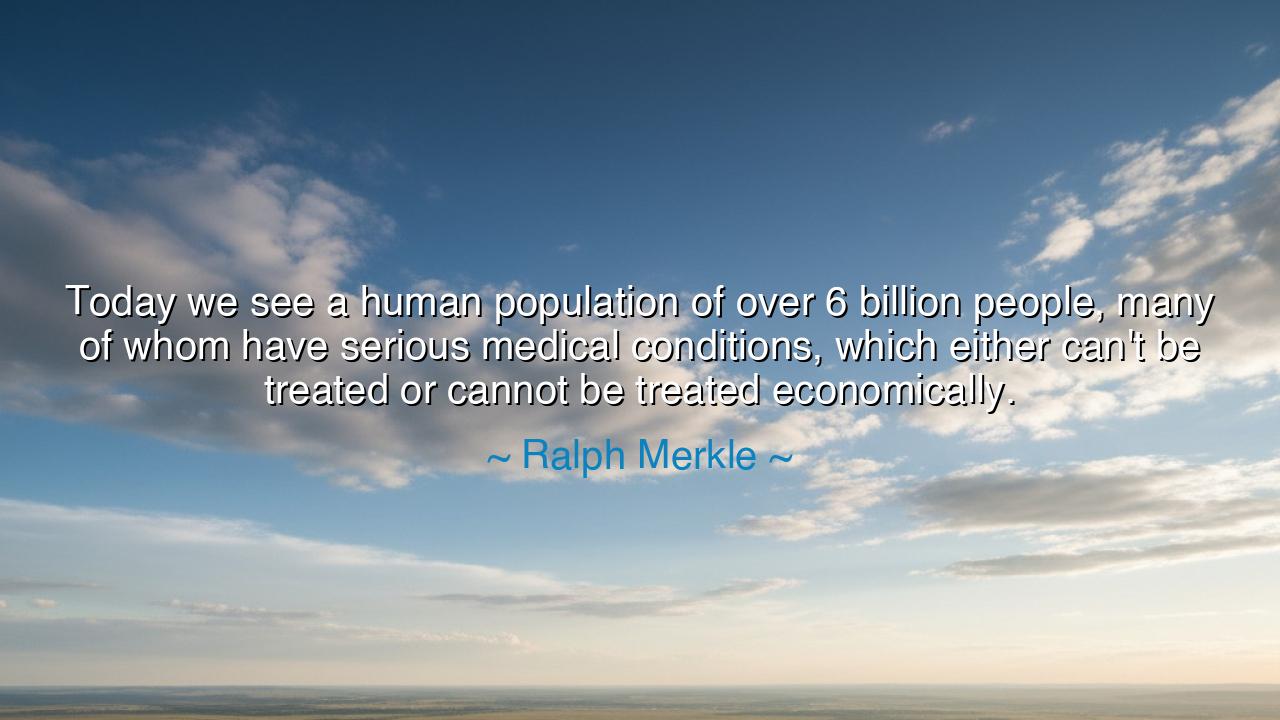
Today we see a human population of over 6 billion people, many of
Today we see a human population of over 6 billion people, many of whom have serious medical conditions, which either can't be treated or cannot be treated economically.






Listen closely, for in the words of Ralph Merkle lies a warning as ancient as the rise of empires and the fall of kings. He speaks of a world teeming with life, a human population surpassing six billion, a multitude of souls whose bodies and spirits bear the weight of ailments both visible and unseen. In this multitude, many suffer serious medical conditions, some of which defy the skill of healers, while others remain beyond the reach of wealth and the coin of kings. It is a reminder that abundance does not always bring health, nor does prosperity ensure relief from suffering. The plight of the sick is not merely a modern tragedy; it is a call to conscience for every age.
Consider the ancient city of Athens, where the plague once struck, leaving thousands in misery, powerless before the invisible hand of disease. Physicians labored tirelessly, yet their knowledge was insufficient to halt the tide of illness. History repeats itself, Merkle observes, not in the form of a plague alone, but in the persistent and growing inability to treat the afflicted due to the economic burdens of medicine. The sorrow is multiplied when human life is measured not in the beat of a heart but in the weight of a ledger. Here, the ancient lesson resurfaces: the measure of a civilization lies not in its towers of gold or walls of stone, but in how it attends to the sick, the weak, and the forgotten.
This modern predicament echoes in the story of Henrietta Lacks, whose immortal cells became the foundation for countless medical breakthroughs. Yet, during her life, she suffered from a cervical cancer that her family could not afford to treat fully, highlighting the cruel irony: the advancement of knowledge often comes at the expense of those too poor to benefit from it. Merkle's words resonate with the injustice inherent in a world where potential cures exist, yet many perish because they cannot access them. The question is timeless: how shall we wield knowledge and power if not to relieve the suffering of our fellow beings?
In the grand tapestry of human endeavor, the challenge is not only scientific but ethical. A population so vast, with ailments so diverse, demands ingenuity, compassion, and foresight. Merkle does not merely enumerate facts; he reveals the moral imperative. For if we stand idle while millions suffer, we betray the very essence of our shared humanity. The lesson echoes like the tolling of a distant bell: those who possess means, knowledge, and ability must act with generosity and courage, for health is the sinew that binds society together.
Let us turn our eyes to the recent triumphs and trials of the COVID-19 pandemic. In mere months, millions faced illness, and yet disparities in treatment and access were glaring. Nations with resources could shield many; those without, left millions exposed. The modern world, despite its towering hospitals and laboratories, mirrors the ancient fragility Merkle describes: disease respects no wealth, yet treatment often bows to it. In every epidemic, every economic barrier to care, the truth of his observation burns bright: health cannot be measured in gold alone.
But despair need not define us. From the suffering rises opportunity: opportunity for innovation, for the creation of systems that treat the poor and empower the powerless. Consider the global expansion of vaccines and telemedicine, which have extended care to distant lands, bringing hope where once there was only sorrow. Merkle's warning transforms into a call to action: to build not merely technology, but equitable access, ensuring that a human life is never weighed against a balance sheet, and that suffering is not tolerated because it is costly.
In reflection, the lesson is clear and urgent. We are stewards of life, tasked with the guardianship of both health and justice. In every community, each individual can act—through advocacy, generosity, education, or innovation—to ensure that medical conditions are met with compassion, not neglect, that remedies reach those who need them, and that the accumulation of wealth and knowledge serves all humanity, not only the privileged few. Merkle’s words, though born in the era of technology and population growth, carry the eternal wisdom of the ancients: our greatness is measured by our care for the suffering.
So hear this, and let it guide your hands and heart: cultivate knowledge, foster compassion, and strive for equity in healing. Build systems, empower others, and remember that a society’s strength is revealed not in its towers, but in the lives it saves, the pain it eases, and the hope it spreads. In doing so, we honor the wisdom of ages past and fulfill the promise that no human should suffer in silence, nor be denied the medicine of life.






AAdministratorAdministrator
Welcome, honored guests. Please leave a comment, we will respond soon